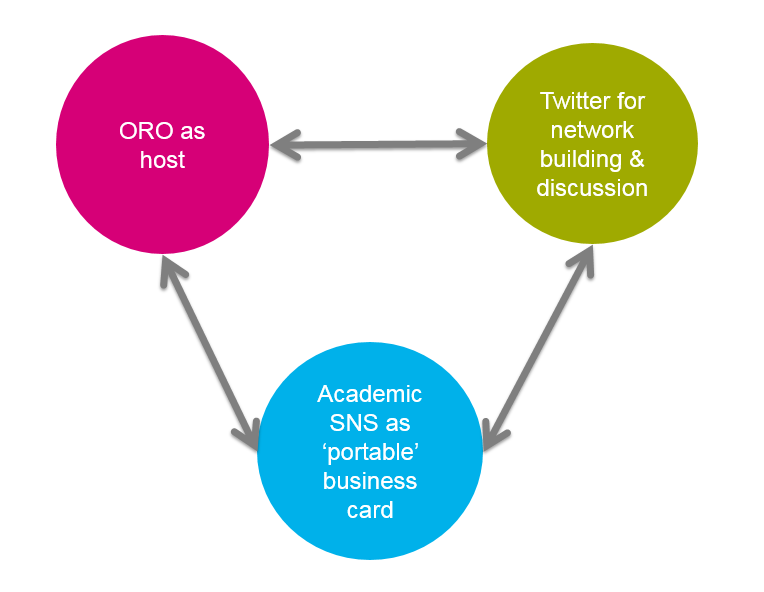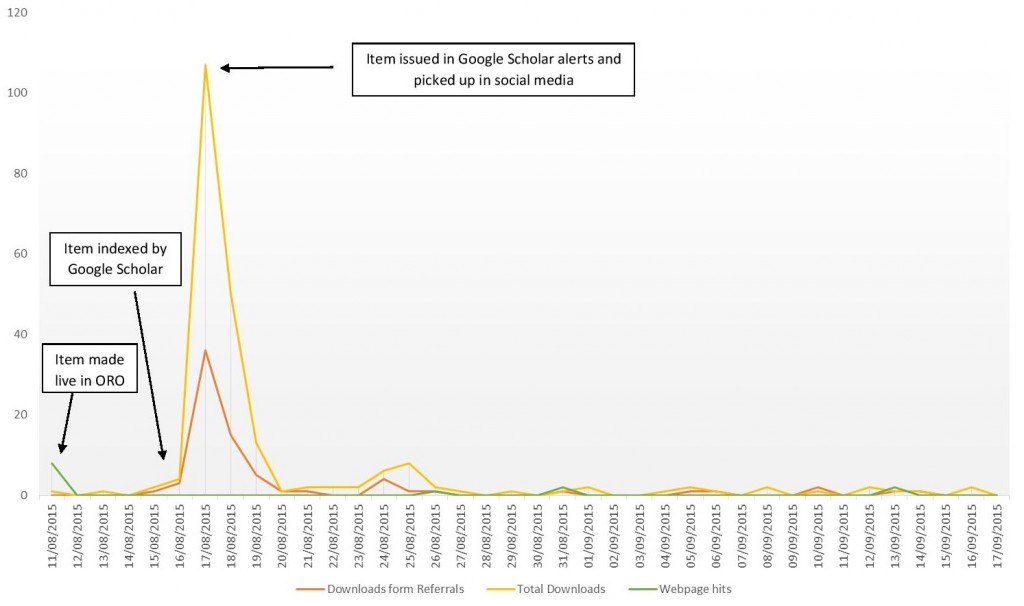We’ve designed a few posters to publicise Open Access publishing please feel free to distribute. PDFs:
- Orange Open Access Poster: OrangeOAPoster
- Stars Open Access Poster: StarsOAPoster
- Clouds Open Access Poster: cloudsOAPoster

We’ve designed a few posters to publicise Open Access publishing please feel free to distribute. PDFs:
 Are you are publishing from a closed FP7 project? If so a pilot Open Access scheme may be able to provide monies to make those publications Open Access via the Gold route.
Are you are publishing from a closed FP7 project? If so a pilot Open Access scheme may be able to provide monies to make those publications Open Access via the Gold route.
Applications should be made at point of acceptance with the publisher, but reimbursements can be made for Open Access charges already paid for eligible publications.
The EU/OpenAIRE pilot allows you to claim:
You are eligible for funds if:
OpenAIRE have produced a useful checklist on the service: GoldOAPilot_Checklist_2016.
A list of current OU FP7 projects that are eligible for the funds is available: Closed OU FP7 Projects eligible for Open Access funding via the OpenAIRE pilot.
Applications for the funds should be made via the online central service.
If you have any questions please get in contact with us at library-research-support@open.ac.uk, we are happy to support you apply for this fund.
Due to the various institutional subscriptions we have with academic publishers, several off-setting deals are now available to OU researchers who wish to publish Gold Open Access.
Springer
 OU researchers publishing in Springer can get articles published Gold at no extra charge. To be eligible you need to be:
OU researchers publishing in Springer can get articles published Gold at no extra charge. To be eligible you need to be:
Sage
Sage currently offer a discounted APC of £200 to all Open University researchers publishing in SAGE Choice journals as the corresponding author.
The reduced rate is a result of the OU’s current subscription to the SAGE Premier Collection.
To access the discounted rate corresponding authors should enter Nesli2015 in the University/Institution Account Code field enter £200 in the Discounts/special journal pricing may apply field and Nesli in the Promo Code field on completion of forms at point of acceptance.
Taylor & Francis
Taylor and Francis currently offer a discounted APC rate of £450 + VAT for OU researchers publishing in a T&F Open Select (hybrid Open Access) journals. A full list of eligible journals can be found here: T&F eligible Open Select journals.
Royal Society of Chemistry (RSC)
RSC have a voucher system – if you are publishing with RSC please contact library-research-support@open.ac.uk and we will issue you with a voucher.
Completing a very simple online form with this voucher & the Digital Object Identifier (doi) or Manuscript Number will get your article published Gold Open Access with no additional costs.
Policy Press offer a 20% discount on APCs for OU authors as the OU currently subscribes to their online content. This reduces the price of an APC with Policy Press from £1,500 to £1,200.
Please note that Library Services can only pay APCs for articles that are the result of a RCUK funded project. For more information see the Open Access intranet site.
Any queries please contact: library-research-support@open.ac.uk

Increasingly, researchers are expected to publish their outputs by open access to satisfy the requirements of the research funders in the UK and abroad. This session will introduce participants to the benefits of open access publishing, and to UK and international funder policies for open access. The session will also address the new HEFCE policy on open access for the post-2014 REF.
This session is open to all.
Booking required in advance, please email library-training@open.ac.uk places will be allocated on a first come first served basis.
Update:
Thanks to everyone who attended the presentation.
Presentation slides area available here: Getting to Grips with Open Access Publishing 2015-12 v2
Session notes are available here: Getting to Grips with Open Access Publishing_Notes_2015-12
Top 15 Downloads for October are below – some are regulars but some new ones tell a story!
During Open Access week I was asked which social media channels drive traffic to ORO the most. I rather dismissively said that the majority of traffic comes directly from Google and that because traffic from social media was relatively small it was barely worth the analysis. And I think generally that is true, looking at October 64,760 ORO hits were directed from Google with 480 from Facebook and 208 from Twitter – so on the face of it it’s not a bad assumption.
However, when I looked a bit more closely at the top 15 there are illuminating exceptions.
Tony Coughlan and Leigh-Anne Perryman’s paper Are student-led Facebook groups open educational practices? received 312 downloads in October. This traffic is almost entirely driven by Facebook – which maybe isn’t a surprise given the content of the paper!
92% of all traffic came from Facebook and only 1% from Google which is a staggering reversal of the general referral pattern. Indeed this one ORO item had 215 referrals from Facebook which accounts for 45% of all traffic coming from Facebook in October!
Tony created a post about the paper back in August – but something happened in Facebook sometime in October which led to the tremendous spike in downloads in October – unfortunately I haven’t been able to trace what that was….
Secondly, Inge de Waard’s MOOC factors influencing teachers in formal education received 301 downloads in October. The breakdown of referrals is a bit more orthodox.
Google is the biggest referrer, but what is interesting is the traffic driven from scoop.it. The paper was scooped and re-scooped by several different users of the service.
The other interesting thing about this one was that the majority of downloads (118) came from the US compared to 9 from the UK – which is another reversal from the general trend – 21,989 from the UK in October compared to 11,829 from the US. But the journal is Mexican and there is also a Spanish version of the paper in ORO so the paper may especially be relevant to an American audience.
In total this item had 23 referrals from scoop.it in October, ORO in total had just 25 referrals. So this item alone accounts for 92% of all referrals from scoop.it.
So what does this mean, if anything?
October Top 15 PDF: OctoberTop15
Springer (in association with Jisc) have recently announced a new Compact for UK Universities and their researchers.
Researchers from eligible UK Universities (including the OU) are now eligible to get their articles published Gold Open Access. No charges need to be paid by the researcher at point of acceptance as they are covered by the general institutional subscription managed in the library.
To be eligible you need to be:
The process is that the author will provide evidence of their institutional affiliation (e.g. institutional email address) at point of acceptance. Springer will then contact the OU (Library Services) to check the researcher is actually affiliated to the OU. Once the OU (Library Services) verifies affiliation the article will be published Open Access.
The system is in effect from now and should run until December 2018 subject to annual opt outs.
Full details (including lists of eligible journals) from Springer can be found here Springer Open Access Compact
On Monday Katy Jordan from IET gave a talk on Academic Social Networking Sites (SNS) as part of Open Access Week. Katy is currently a postgraduate student and her provisional thesis title is Reshaping the Higher Education network? Analysis of academic social networking sites, so she was a natural choice to ask!
As the ORO manager I’m often asked how sites like ResearchGate and Academia.edu interact with the institutional repository, so I was a little anxious as to the implications for ORO from Katy’s research. But Katy’s talk was actually a resounding re-affirmation of the case for the Institutional Repository.
Katy presented a diagram in her presentation where ORO sits alongside and complements both Twitter and Academic SNS.
Katy’s talk was both wide ranging and engaging, other themes I found particularly pertinent were:
Katy’s presentation is available here: http://www.slideshare.net/katyjordan148/academic-social-networking-sites.
Thanks again to Katy for a fascinating talk.

Next week is Open Access Week, and to celebrate, together with RSQ Unit we’ve arranged a series of lunchtime events.
Lunch will be provided; register by following the links below to guarantee your place.
Academic Social Networking Sites
Katy Jordan (Institute of Educational Technology) will discuss the emergence of academic networking sites such as ResearchGate and Academia.edu, and their impact on openness of research in the academic community.
Open Data
The Pelagios project seeks to use linked open data to create connections between places in the ancient world and the present. Dr Elton Barker from the Classics Department will introduce attendees to the way in which open data is being applied to create a new sense of the world in this project.
Running an Open Access Journal
A panel featuring the editors of the OU’s Open Access journals: Francesca Benatti (Arts), Clem Herman (Maths, Computing and Technology) and Martin Weller (Institute of Educational Technology) will discuss the role of university-based open access journals in meeting the challenges of academic publishing in the 21st century.
Open Research Online (ORO): The Gateway to Green Open Access Publishing
A panel of OU researchers: Richard Blundel (Faculty of Business and Law), Simon Kelley (Science) Agnes Kukulska-Hulme (Institute of Educational Technology) and Shailey Minocha (Maths, Computing and Technology) will discuss how using ORO has opened up new horizons for their research, introducing their publications to new audiences, and bringing them in contact with researchers and professionals from around the world.
We look forward to seeing you there!
Are you interested in making your research more open?
The 8th annual International Open Access week runs from 19th -23rd October and to celebrate, Library Services in conjunction with Research Scholarship and Quality (RSQ) Unit have organised a series of lunchtime events.
This year we are highlighting a number of the OU’s Open Access success stories, including:
Sessions are open to all, and lunch will be provided.
For more information and to sign up, visit the Open Access Week event page.
Top downloads from ORO in August are available below.
PDF version available here: AugustTop15
One item new to the Top 15 is Removing barriers for citizen participation to urban innovation by Annika Wolf et. al. or ORO ID 43854.
This paper was only made live in ORO on 11th August and collected over 200 downloads by the end of the month. Digging into the short online history of this paper was quite instructive.
The paper was indexed by Google Scholar on the 15th August and was issued in relevant Google Scholar alerts on the 17th August. It was picked up in the social media and tweeted (most notably by @participatory on the 17th August). Downloads immediately peaked at over 100 including nearly 40 downloads referred from twitter. The importance of repositories, web scale indexing and alerts, and social media in the dissemination of scholarly publications is strikingly apparent.
 And throughout this, hits to the ORO webpage (the abstract view) were virtually zero. So the repository is in a way invisible to the reader – and I’m not sure that really matters. As long as we structure good metadata around content and are visible to services like Google Scholar then our research publications can be surfaced wherever the reader finds them.
And throughout this, hits to the ORO webpage (the abstract view) were virtually zero. So the repository is in a way invisible to the reader – and I’m not sure that really matters. As long as we structure good metadata around content and are visible to services like Google Scholar then our research publications can be surfaced wherever the reader finds them.